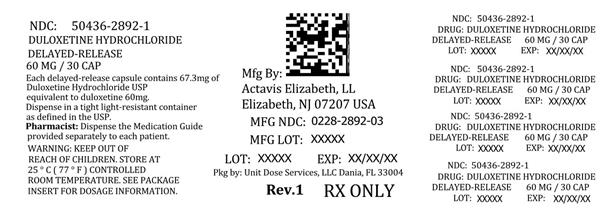
Duloxetine Capsule, Delayed Release Pellets while Breastfeeding
What is Duloxetine Capsule, Delayed Release Pellets used for?
I am currently breastfeeding and I want to know if using Duloxetine Capsule, Delayed Release Pellets is safe for my kid? Does it have any effect on milk production?

8.3 Nursing Mothers Risk Summary Duloxetine hydrochloride is present in human milk. In a published study, lactating women who were weaning their infants were given duloxetine delayed-release capsules. At steady state, the concentration of duloxetine hydrochloride in breast milk was approximately 25% that of maternal plasma. The estimated daily infant dose was approximately 0.14% of the maternal dose. The developmental and health benefits of human milk feeding should be considered along with the mother’s clinical need for duloxetine delayed-release capsules and any potential adverse effects on the milk-fed child from the drug or from the underlying maternal condition. Exercise caution when duloxetine delayed-release capsules are administered to a nursing woman. Data The disposition of duloxetine delayed-release capsules was studied in 6 lactating women who were at least 12 weeks postpartum and had elected to wean their infants. The women were given 40 mg of duloxetine delayed-release capsules twice daily for 3.5 days. The peak concentration measured in breast milk occurred at a median of 3 hours after the dose. The amount of duloxetine hydrochloride in breast milk was approximately 7 mcg/day while on that dose; the estimated daily infant dose was approximately 2 mcg/kg/day. The presence of duloxetine hydrochloride metabolites in breast milk was not examined.
Duloxetine Capsule, Delayed Release Pellets Breastfeeding Analsys
Duloxetine while Breastfeeding
SafeCAS Number: 116539-59-4
It is a reuptake-inhibitor of Serotonin and Norepinephrine. Excreted into breast milk in clinically non-significant amount with no side-effects being observed in breastfed infants from treated mothers. Plasma level in those infants was very low or undetectable. Because there is less experience published than with other antidepressants of the same pharmacological group, it should be preferred the use of an alternative drug that is known to be safer in the neonatal period or prematurity. Galactorrhea has been observed but less frequently than with other antidepressants. Women who use antidepressant medication during pregnancy are in need of more support for breastfeeding since they are at risk for early weaning.
Duloxetine Capsule, Delayed Release Pellets Breastfeeding Analsys - 2
Duloxetine while Breastfeeding
CAS Number: 116539-58-3
Little published information is available on the use of duloxetine during breastfeeding; however, the dose in milk is low and serum levels were low in two breastfed infants. An alternate drug that has been better studied may be preferred, especially while nursing a newborn or preterm infant. If duloxetine is required by the mother, it is not a reason to discontinue breastfeeding. Monitor the infant for drowsiness, adequate weight gain, and developmental milestones, especially in younger, exclusively breastfed infants and when using combinations of psychotropic drugs. Galactorrhea has been reported in women taking duloxetine.
I already used Duloxetine Capsule, Delayed Release Pellets and meanwhile I breastfed my baby should I be concerned?
Duloxetine Capsule, Delayed Release Pellets is safe in breastfeeding and should not create any health problem for your baby but in case you feel any health issue associated with Duloxetine Capsule, Delayed Release Pellets you should contact your doctor or health care provider. Be it pregnancy or lactation you shall keep your doctor informed.
My health care provider has asked me to use Duloxetine Capsule, Delayed Release Pellets, what to do?
Definitely, Duloxetine Capsule, Delayed Release Pellets is safe in lactation for baby. No wonder your doctor has recommended it.
If I am using Duloxetine Capsule, Delayed Release Pellets, will my baby need extra monitoring?
No extra baby monitoring required while mother is using Duloxetine Capsule, Delayed Release Pellets
Who can I talk to if I have questions about usage of Duloxetine Capsule, Delayed Release Pellets in breastfeeding?
US
National Womens Health and Breastfeeding Helpline: 800-994-9662 (TDD 888-220-5446) 9 a.m. and 6 p.m. ET, Monday through Friday
UK
National Breastfeeding Helpline: 0300-100-0212 9.30am to 9.30pm, daily
Association of Breastfeeding Mothers: 0300-330-5453
La Leche League: 0345-120-2918
The Breastfeeding Network supporter line in Bengali and Sylheti: 0300-456-2421
National Childbirth Trust (NCT): 0300-330-0700
Australia
National Breastfeeding Helpline: 1800-686-268 24 hours a day, 7 days a week
Canada
Telehealth Ontario for breastfeeding: 1-866-797-0000 24 hours a day, 7 days a week
